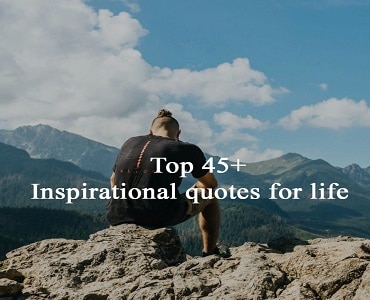Wilderness Quotes
1. The clearest way into the Universe is through a forest wilderness.
2. I am glad I will not be young in a future without wilderness.
3. We need the tonic of wildness…At the same time that we are earnest to explore and learn all things, we require that all things be mysterious and unexplorable, that land and sea be indefinitely wild, unsurveyed and unfathomed by us because unfathomable. We can never have enough of nature.
4. Thousands of tired, nerve-shaken, over-civilized people are beginning to find out that going to the mountains is going home; that wildness is a necessity.
5. What we are doing to the forests of the world is but a mirror reflection of what we are doing to ourselves and to one another.
6. Sometimes when you lose your way, you find YOURSELF.
7. It had nothing to do with gear or footwear or the backpacking fads or philosophies of any particular era or even with getting from point A to point B.
It had to do with how it felt to be in the wild. With what it was like to walk for miles with no reason other than to witness the accumulation of trees and meadows, mountains and deserts, streams and rocks, rivers and grasses, sunrises and sunsets. The experience was powerful and fundamental. It seemed to me that it had always felt like this to be a human in the wild, and as long as the wild existed it would always feel this way.
8. Be wild; that is how to clear the river. The river does not flow in polluted, we manage that. The river does not dry up, we block it. If we want to allow it its freedom, we have to allow our ideational lives to be let loose, to stream, letting anything come, initially censoring nothing. That is creative life. It is made up of divine paradox. To create one must be willing to be stone stupid, to sit upon a throne on top of a jackass and spill rubies from one’s mouth. Then the river will flow, then we can stand in the stream of it raining down.
9. Something will have gone out of us as a people if we ever let the remaining wilderness be destroyed … We simply need that wild country available to us, even if we never do more than drive to its edge and look in.
10. If Music is a Place — then Jazz is the City, Folk is the Wilderness, Rock is the Road, Classical is a Temple.
11. Wildness is the preservation of the World.
12. There is a love of wild nature in everybody, an ancient mother-love showing itself whether recognized or no, and however covered by cares and duties
13. Mountains seem to answer an increasing imaginative need in the West. More and more people are discovering a desire for them, and a powerful solace in them. At bottom, mountains, like all wildernesses, challenge our complacent conviction – so easy to lapse into – that the world has been made for humans by humans. Most of us exist for most of the time in worlds which are humanly arranged, themed and controlled. One forgets that there are environments which do not respond to the flick of a switch or the twist of a dial, and which have their own rhythms and orders of existence. Mountains correct this amnesia. By speaking of greater forces than we can possibly invoke, and by confronting us with greater spans of time than we can possibly envisage, mountains refute our excessive trust in the man-made. They pose profound questions about our durability and the importance of our schemes. They induce, I suppose, a modesty in us.
14. To those devoid of imagination a blank place on the map is a useless waste; to others, the most valuable part.
15. To be commanded to love God at all, let alone in the wilderness, is like being commanded to be well when we are sick, to sing for joy when we are dying of thirst, to run when our legs are broken. But this is the first and great commandment nonetheless. Even in the wilderness – especially in the wilderness – you shall love him.
16. Like music and art, love of nature is a common language that can transcend political or social boundaries.
17. Ô, Wanderess, Wanderess
When did you feel your
most euphoric kiss?
Was I the source
of your greatest bliss?
18. And this is what happened, ands this is why the caribou and the wolf are one; for the caribou feeds the wolf, but it is the wolf that keeps the caribou strong.
19. The Wilderness holds answers to more questions than we have yet learned to ask.
20. We had no choice. Sadness was a dangerous as panthers and bears. the wilderness needs your whole attention.
21. All conservation of wildness is self-defeating, for to cherish we must see and fondle, and when enough have seen and fondled, there is no wilderness left to cherish.
22. The sea is a desert of waves,
A wilderness of water.
23. It is a commonplace of all religious thought, even the most primitive, that the man seeking visions and insight must go apart from his fellows and love for a time in the wilderness.
24. It was like hiking into a Hemingway story; everything was sepia-toned and bristling with subtext.
25. One who will not accept solitude, stillness and quiet recurring moments…is caught up in the wilderness of addictions; far removed from an original state of being and awareness. This is ‘dis-ease.
26. All America lies at the end of the wilderness road, and our past is not a dead past, but still lives in us. Our forefathers had civilization inside themselves, the wild outside. We live in the civilization they created, but within us the wilderness still lingers. What they dreamed, we live, and what they lived, we dream.
27. I had learnt the satisfaction which comes from hardship and the pleasure which derives from abstinence; the contentment of a full belly; the richness of meat; the taste of clean water; the ecstasy of surrender when the craving of sleep becomes a torment; the warmth of a fire in the chill of dawn.
28. Man always kills the thing he loves, and so we the pioneers have killed our wilderness. Some say we had to. Be that as it may, I am glad I shall never be young without wild country to be young in. Of what avail are forty freedoms without a blank spot on the map?
29. The whole concept of ‘wild’ was decidedly European, one not shared by the original inhabitants of this continent. What we called ‘wilderness’ was to the Indian a homeland, ‘abiding loveliness’ in Salish or Piegan. The land was not something to be feared or conquered, and ‘wildlife’ were neither wild nor alien; they were relatives.
30. Why is it that we don’t worry about a compass until we’re lost in a wilderness of our own making?
31. Maybe freedom really is nothing left to lose. You had it once in childhood, when it was okay to climb a tree, to paint a crazy picture and wipe out on your bike, to get hurt. The spirit of risk gradually takes its leave. It follows the wild cries of joy and pain down the wind, through the hedgerow, growing ever fainter. What was that sound? A dog barking far off? That was our life calling to us, the one that was vigorous and undefended and curious.
32. … there’s a silent voice in the wilderness that we hear only when no one else is around. When you go far, far beyond, out across the netherlands of the Known, the din of human static slowly fades away, over and out.
33. I am the wilderness lost in man.
35. Anthropocentric as [the gardener] may be, he recognizes that he is dependent for his health and survival on many other forms of life, so he is careful to take their interests into account in whatever he does. He is in fact a wilderness advocate of a certain kind. It is when he respects and nurtures the wilderness of his soil and his plants that his garden seems to flourish most. Wildness, he has found, resides not only out there, but right here: in his soil, in his plants, even in himself…
But wildness is more a quality than a place, and though humans can’t manufacture it, they can nourish and husband it…
The gardener cultivates wildness, but he does so carefully and respectfully, in full recognition of its mystery.
36. Civilized Man says: I am Self, I am Master, all the rest is other–outside, below, underneath, subservient. I own, I use, I explore, I exploit, I control. What I do is what matters. What I want is what matter is for. I am that I am, and the rest is women & wilderness, to be used as I see fit.
37. I thought of the wilderness we had left behind us, open to sea and sky, joyous in its plenitude and simplicity, perfect yet vulnerable, unaware of what is coming, defended by nothing, guarded by no one.
38. Something will have gone out of us as a people if we ever let the remaining wilderness be destroyed; if we permit the last virgin forests to be turned into comic books and plastic cigarette cases; if we drive the few remaining members of the wild species into zoos or to extinction; if we pollute the last clear air and dirty the last clean streams and push our paved roads through the last of the silence . . .
39. If we are to have a culture as resilient and competent in the face of necessity as it needs to be, then it must somehow involve within itself a ceremonious generosity toward the wilderness of natural force and instinct. The farm must yield a place to the forest, not as a wood lot, or even as a necessary agricultural principle but as a sacred grove – a place where the Creation is let alone, to serve as instruction, example, refuge; a place for people to go, free of work and presumption, to let themselves alone. (pg. 125, The Body and the Earth)
40. …a city that was to live by night after the wilderness had passed. A city that was to forge out of steel and blood-red neon its own peculiar wilderness.
41. Wilderness to the people pf America is a spiritual necessity, an antidote to the high pressure of modern life, a means of regaining serenity and equilibrium.
42. The oceans are the planet’s last great living wilderness, man’s only remaining frontier on Earth, and perhaps his last chance to prove himself a rational species.
43.In the same way that the picturesque designers were always careful to include some reminder of our mortality in their gardens — a ruin, sometimes even a dead tree — the act of leaving parts of the garden untended, and calling attention to its margins, seems to undermine any pretense to perfect power or wisdom on the part of the gardener. The margins of our gardens can be tropes too, but figures of irony rather than transcendence — antidotes, in fact, to our hubris. It may be in the margins of our gardens that we can discover fresh ways to bring our aesthetics and our ethics about the land into some meaningful alignment.
44. Nature is an outcry, unpolished truth; the art—a euphemism—tamed wilderness.
45. There is language going on out there- the language of the wild. Roars, snorts, trumpets, squeals, whoops, and chirps all have meaning derived over eons of expression… We have yet to become fluent in the language -and music- of the wild.
46. I own a crevice stuffed with moss
and a couch of lemming fur;
I sit and listen to the music
of water dripping on a distant stone.
Or I sing to myself
of stealth and loneliness
No one comes to see me
but I hear outside
the scratching of claws,
the warm, inquisitive breath …
(from ‘The Hermitage’)
47. I had some terrific experiences in the wilderness since I wrote you last – overpowering, overwhelming,” he gushed to his friend Cornel Tengel. “But since then I am always being overwhelmed. I require it to sustain life.
48. Wilderness gave us knowledge. Wilderness made us human. We came from here. Perhaps that is why so many of us feel a strong bond to this land called Serengeti; it is the land of our youth.
49. I’d forgotten how enlivening it could feel, seeing clearly and far. Aridity frees light. It also unleashes grandeur. The earth here wasn’t cloaked in forest, nor draped in green. Green was pastoral, peaceful, mild. Desert beauty was “sublime” in the way that the romantic poets had used the word- not peaceful dales but rugged mountain faces, not reassuring but daunting nature, the earth’s skin and haunches, its spines and angles arching prehistorically in sunlight.
50. Much of human behavior can be explained by watching the wild beasts around us. They are constantly teaching us things about ourselves and the way of the universe, but most people are too blind to watch and listen.
51. Every morning in the middle of nowhere, without electricity or anyone to impress, I’d take great care in picking out my outfit and hover in front of a business card-size mirror to apply my lip gloss and check my eyebrows. I also felt I had a strong case for bringing a little black dress on expeditions. Village parties spring up more often than you might expect, and despite never having been a Girl Scout, I like to be prepared.
52. …William Stegner…coined the term ‘the geography of hope,’ countering the argument that wilderness preservation served elites with the assertion that wilderness could be a place in which everyone could locate their hopefulness even if few actually entered it.
53. Until humans came and made anthills out of these mountains, Diwan Sahib was saying, looking up at the langurs, the land had belonged to these monkeys, and to barking deer, nilgai, tiger, barasingha, leopards, jackals, the great horned owl, and even to cheetahs and lions. The archaeology of the wilderness consisted of these lost animals, not of ruined walls, terracotta amulets, and potsherds.
54. [Thoreau’s] famous night in jail took place about halfway through his stay in the cabin on Emerson’s woodlot at Walden Pond. His two-year stint in the small cabin he built himself is often portrayed as a monastic retreat from the world of human affairs into the world of nautre, though he went back to town to eat with and talk to friends and family and to pick up money doing odd jobs that didn’t fit into Walden’s narrative. He went to jail both because the town jailer ran into him while he was getting his shoe mended and because he felt passionately enough about national affairs to refuse to pay his tax. To be in the woods was not to be out of society or politics.
55. Since well before the Kung’s engine noise first penetrated the forest, a conversation of sorts has been unfolding in this lonesome hollow. It is not a language like Russian or Chinese but it is a language nonetheless, and it is older than the forest. The crows speak it; the dog speaks it; the tiger speaks it, and so do the men–some more fluently than others.
56. Lured by the wilderness, and by the chance of spotting rare desert elephants, a few intrepid tourists make their way to the Skeleton Coast each year. It’s just about as remote as any tourist destination on earth, but one that pays fabulous dividends.
57. A flower’s structure leads a bee toward having pollen adhere to its body . . . we don’t know of any such reason why beautiful places attract humans.
58. Now, wilderness can be seen as a useful fiction, a fiction constructed by John Muir and his heirs and deployed to keep places from being destroyed by resource extraction and wholesale development.
59. To the question: Wilderness, who needs it? Doc would say: Because we like the taste of freedom, comrades. Because we like the smell of danger. But, thought Hayduke, what about the smell of fear, Dad?
60. You can stretch to your fullest in this land, Emma, and not touch any edges. There’s no dream too big for the wilderness. I’d hate to see it tamed and carved up into little fiefdoms.





